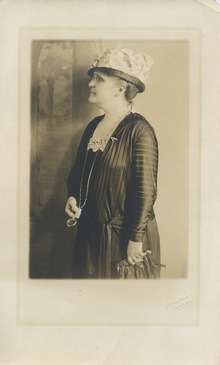Annie Nathan Meyer
Annie Nathan Meyer (February 19, 1867 – September 23, 1951) was an American author, an anti-suffragist and a promoter of higher education for women. Her sister was the activist Maud Nathan and her nephew the author and poet Robert Nathan.

Early years and education
She was born in New York City in 1867,[1] the daughter of Annie August and Robert Weeks Nathan. The Nathans are one of America's colonial-era Sephardic families. Meyer's childhood encountered many hardships as the Crash of 1873 damaged her parents’ financial status. In 1875, the family moved from New York to Green Bay, Wisconsin for employment opportunities.
Since she was withheld from public school by her mother's request, Meyer was self-educated and claimed to have read all of Dickens' work by the age of seven. Meyer tutored herself in order to enroll in the newly established Columbia College Collegiate Course for Women in 1885. The course did not recognize participants as fully enrolled students, because, at the time, Columbia University did not officially enroll women. She did not attend because she married Alfred Meyer,[1] a prominent physician and a second cousin on February 15, 1887.
Career
.png)
Within weeks of her wedding, Meyer began organizing a committee to fund a women's college at Columbia in an effort to provide young women the opportunity for an education that she herself had not enjoyed. In January 1888, Meyer wrote a 2,500 word essay to The Nation arguing New York City lacked culture in comparison to other major cities because it lacked a liberal arts college for women. Meyer understood that the idea was nothing without funding. So, working with Ella Weed, she created a committee of fifty prominent New Yorkers willing to support the projected college. She overcame the opposition of the Columbia University trustees by naming the college after Frederick Barnard, Columbia's recently deceased president and a strong advocate for coeducation. The college Meyer founded, Barnard College, is one of the Seven Sisters and ranks today as one of America's most elite colleges.
She later became known as an opponent of woman suffrage[1] (in direct conflict to her sister and suffragist Maud Nathan). At one time, Annie Nathan Meyer was associate editor of the Broadway Magazine. She edited Woman's Work in America (1891) and contributed a series of articles to the New York Evening Post.
Selected works
- Barnard Beginnings (1935)
- Helen Brent, M. D. (1892)
- My Park Book (1898)
- Robert Annys: A Poor Priest (1901)
- The Dominant Sex (1911)
- The Dreamer; a Play in Three Acts (1912)
- Women's Work in America (1891)
- It's Been Fun: An Autobiography (1951)
References
- "Meyer, Annie Nathan", The Encyclopedia Americana, retrieved 2018-10-10
Bibliography
- Rines, George Edwin, ed. (1920). . Encyclopedia Americana.
- Dora Askowith, Three Outstanding Women: Mary Fels, Rebekah Kohut [and] Annie Nathan Meyer, 1941
- Myrna Gallant Goldenberg, Annie Nathan Meyer: Barnard Godmother and Gotham Gadfly, 1987